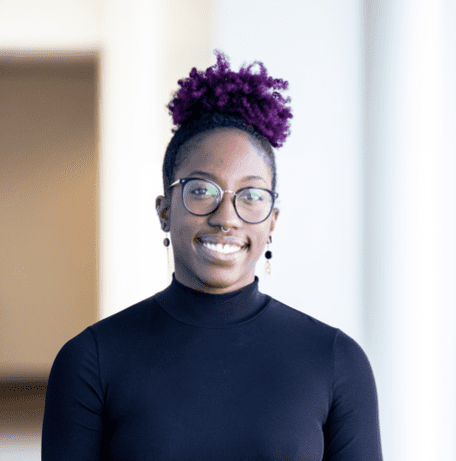Humans of Haas: Kellie McElhaney
Written by Emma Desilva.
Professor Kellie McElhaney is a Berkeley Haas faculty as a Distinguished Teaching Fellow and the Founding Director of the Center for Equity, Gender and Leadership (EGAL). In 2003, she founded the Center for Responsible Business, solidifying corporate responsibility as a core competency and competitive advantage for the Haas School. She received the Founder and Visionary Award at Haas in 2013 for this work. She also wrote a book entitled “Just Good Business: The Strategic Guide to Aligning Corporate Responsibility and Brand.” Professor McElhaney consults and keynotes for Global 1000 companies and organizations all over the world on her areas of expertise, and has a TED talk. She is the mother of two incredibly strong teenage daughters.
1.) What was your career path like?
It’s not the answer that planful Haas students want to hear, because I didn’t follow a straight line. I went into banking, which was a great first job to start out, but I saw a lot of discrimination happening, both towards me, as a woman, but much more around people of color. Then, in the early 90’s, I quit banking and got into a PhD program. Before I did that, I wanted to do something totally different and had an opportunity to teach in China. It was the first time I knew what it felt like to be part of a non-dominant group, physically, ethnically, religiously, and politically. Kids used to reach out and touch me because I was so tall! In terms of what I decided to focus on in my PhD, it came to me in China. I was in a relatively remote area where we couldn’t get electricity most nights in our flat and often couldn’t get running water, but you could get a Coca-Cola anywhere. How was Coke able to do that? So I then started to think about how we could harness the power of companies to do what governments and the public sector could not do and use this power for good. This is when I switched into the area of Corporate Responsibility, but gender and diversity were still on the radar in my mind.
While I was working as a banker, there was only one woman at the executive level, so I didn’t see myself there. Then I went into a doctoral program, where there were very few women and then I became a professor, and there were even less women. Then I had two daughters and that’s really what made me think about what kind of world they had just been born into and what can I do to make the world a better place.
When I was teaching in the MBA program at Michigan, it was 25% women. I started off teaching Corporate Strategy, where the demographics reflected the 25% women and 75% men. Then I started teaching courses in the area of Corporate Social Responsibility, and the demographics completely flipped. My CSR courses were oversubscribed by women. Teaching was an early way to connect two parts of my career, sustainability and diversity. I went out there digging and found that women took the CSR course because they wanted to do something in their life that made the world a better place. When looking at females as investors, I found that they are more likely to use an ESG screen (environment, social, and governance). When looking at job choice for women, women and men both looked at geographic location and salary, but the third driver for women was the company’s social responsibility reputation and for men, it was the challenging work assignments. It was when I went full throttle on diversity that I felt like this was “what I wanted to do when I grow up”- that elusive thing for which we all search.
2.) What drove you to Berkeley Haas and how has Berkeley Haas helped you during your time here?
There had been a phenomenal Haas undergrad who had given a million dollars back to Haas. His name was Mike Homer (BS’81) and he passed away at a young age due to Creutzfeldt–Jakob disease, a very rare and incurable degenerative neurological disorder. Throughout my years here at Haas, Mike was one of my biggest supporters, mentors, and dear friends. He gave back to Haas because he wanted kids to graduate and immediately start giving back and not feel the need to have tons of money before they thought about giving back.
The Berkeley Haas Dean at the time had been looking to bring in someone to do work around Social Impact. One of my mentors at the University of Michigan told me to apply for the job, I said no way, California is crazy and expensive, so I turned it down twice. The third time, Bob Haas called me and said: “I want to transform business education and I want you to be my partner in crime.” So I give all the credit to Bob Haas for bringing me to Berkeley. It is the difference between San Francisco and the other cities I had lived in that made me want to stay – the mentality of progressive thinking and social awareness.
3.) What is some advice you have for current students?
Ask for support. Having had strong mentors in my life has been so valuable, but I often think about the people who had offered to mentor, but with whom I did not follow up. I often hear that kids want to do it on their own and they don’t need anyone’s help, but life isn’t lived on its own so I encourage students to reach out. If someone offers to mentor you, to advise you, to help you out, don’t wait. Follow up and check in often.
Another is self care. I grew up in a generation where women were told we could do it all. Often working Moms were called selfish, because we wanted to do it all. In trying to, we completely disregarded self care. I learned the hard way that this is not a sustainable way to love. My health sufferened and I was forced to prioritize and practice self care. And find your people. I have a squad- of women and men- to help me through tough times. A couple of years ago, I realized, though, that my squad was not a diverse group; they were very similar to me. Diversifying my squad was probably one of the best things I ever did, bringing in new perspectives outside of my own.
The times in my life where I can’t see the road ahead are the times I need to get quiet with myself because the road is there even if I struggle so hard to see it. People say live the questions, not seek the answers.I think in today’s world we’re so fiercely driven to grind up the vertical ladder at top speed. But really, life is so much more exciting when you’re more open to twists and turns.
The earlier in your life you push back on gender norm roles, the more progress can be made. In the workplace, more women volunteer or are given tasks like organizing happy hours or birthdays. Push back early on those things because it’s a dangerous track and it’s really hard to reverse it. The women who become the party planners take time out their day that doesn’t show up on their performance appraisal, so it is literally taking time out of a finite resource. They won’t be getting a bonus on the great parties they put together. A challenge is once women say no, they’re seen as selfish. So for women, question and push back on normative gender role assignments early on. And for men, step up and contribute to these normatively female assignments, because it can have an effect on other men watching. One of the best pieces of advice I got, which isn’t as applicable anymore as we all have laptops and tablets, was to never walk into a meeting with a pen or pencil, because men will always look to you to take notes.
And finally, talk about money. It has struck me how much women don’t talk about money. Salary and total compensation knowledge is power. Talk about signing bonuses and stock option packages, because the salary gap is real and very deeply embedded.


